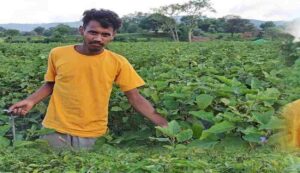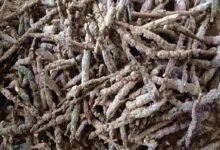Brinjal Farming: Bumper income from brinjal cultivation, know the unique story of a farmer from Surguja
Brinjal Farming: An example has been set by a young farmer from Navanagar village in Chhattisgarh’s Surguja district, who makes a lot of money growing brinjal organically. So far, this farmer has made up to Rs 2 lakh in profit. With his perseverance and hard work, Nameshwar Paikra of Navanagar village, which is just 25 kilometers from the division headquarters in Ambikapur, has really broken the previous agricultural record. Nameshwar Paikra, a 12th grader, has shown via his grafted organic brinjal farming that it is feasible to make thousands of rupees in profit if farming is done with the proper method and diligence. As of right now, he has made Rs 2 lakh from the farming he did in April.

Harvesting and farming practices
According to Nameshwar Paikra, he utilized cow dung manure to cultivate brinjal grafted on one acre of land. Approximately thirty harvests have been completed since the April seeding. Harvesting is still ongoing, and it will take almost a year to complete.
Costs and earnings
The young people estimate that growing brinjal costs around Rs 1 lakh. After 30 rounds of harvesting, he has so far made up to Rs 2 lakh in profit. In the next months, a profit of up to Rs 2 lakh might be possible. That is, it is anticipated that a total of around Rs 4 lakh would be earned. In the Ambikapur vegetable market, Nameshwar sells his brinjals for between Rs 25 and Rs 30 per kilogram.
What made him decide to cultivate brinjal?
Nameshwar said that he took up his father’s job after finishing his education up to the 12th grade. Nameshwar, who comes from a farming family, grows brinjal on a vast scale each year and provides a comfortable living for his family.
More money, less effort
According to him, growing brinjal doesn’t take a lot of labor; sometimes, fertilizer and care are all that are required. He has so far placed three carts of cow dung manure on the field and is consistently using organic agricultural practices.

